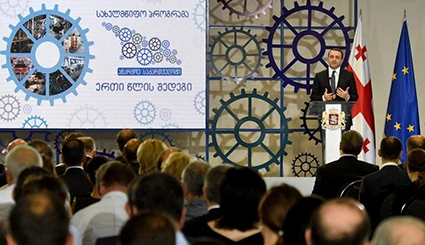Dechert OnPoint Overview: “Produce in Georgia”
On1 June 2014, the Government of Georgia the (“GoG”) launched the Program “Produce in Georgia” (the “Program”), supervised by the Ministry of Economy and Sustainable Development of Georgia (the “MoESD”) and the Ministry of Agriculture of Georgia (the “MoAG”). The Program aims to foster competitive local production by encouraging production of Georgian products and guaranteeing high quality domestic production. The terms and conditions of the Program are set out in Decree #365 of the GoG dated 30 May 2014 (the “Decree”).
This week’s OnPoint provides an overview of the Program, focusing on its two main components: the industrial and agricultural sectors. The article describes financing opportunities and other support vehicles available to Georgian businesses under Produce in Georgia. Industrial sector support will be addressed in Part I, while Part II focuses on the opportunities available to Agricultural sector players.
I. Industrial Sector
The Program intends to support a wide range of industries, starting with food and fuel production extending to the energy sector and natural resources exploitation. A specific list of the industries supported is set out in Annex 1 of the Decree. The program envisages three types of support for the Industrial Sector: (a) financial support; (b) transfer of state-owned land plots; and (c) technical assistance. Applications for this part of the Program can be made before 15 December 2015.
Financial Support
Financial support can be granted for the establishment of new production facilities as well as for expanding existing production. The beneficiary of the Program (the “Beneficiary”) may benefit from only one of the following forms of financing (i) co-financing loans obtained by the Beneficiary from commercial banks; or (ii) co-financing leases of property used by the Beneficiary during production.
Co- financing of loans
The program co-finances the interest accruing on the loan received by the Beneficiary. The co-financing period may not exceed 24 months, while the co-financing share is: (i) 8% per annum for a loan issued in USD (e.g. if the loan has an annual rate of 9%, the GoG will assume an annual rate of 8% while the lender will pay the remaining 1% per annum); or (ii) 10% per annum in cases of GEL denominated loans; or backs the loan of the Beneficiary by granting a second-ranking security not exceeding 50% of the principal amount of the loan, and in any case no more than USD 1,000,000/GEL 2,500,000 in value for a maximum period of 48 months from issuance of the loan.
The eligible Beneficiaries are those which receive a loan for their business projects (the “Project”) from commercial banks in Georgia, in an amount between the minimum of USD 150,000/GEL 250,000 and the maximum of USD 2,000,000/GEL 5,000,000, with the annual interest rate of the USD loans not exceeding 9-11% and 11-13% for GEL loans per annum. Once the Project and the loan is approved by the bank, the Beneficiary shall apply to the Agency of Entrepreneurial Development (the “Agency”), which operates under the auspices of the MoESD, and request the co-financing of the loan. The Agency, through the MoESD, submits the Project to the GoG for approval. Notably, there is no specific timeline set for approval of the Project by the GoG.
Co-financing of leases
The eligible Beneficiaries for lease co-financing shall conclude a loan agreement with the lessor to lease a property in an amount between USD 50,000 and USD 2,000,000. The Program requires that the annual interest rate accrued on the lease by the lessor shall be between 13-15% depending on the value of the leased property. The Program will co-finance 12% of said interest during a 24 month period. To receive co-financing the Beneficiary shall apply to the Agency and submit the lease agreement on the equipment to be used for production. The Agency, through the MoESD, submits the Beneficiary’s project to the GoG for approval.
Transfer of Land
The transfer of land component follows the following structure: (i) the direct sale of state-owned non-agricultural land plots with or without fixed premises to the Beneficiary for a symbolic price of GEL 1; and (ii) fulfillment of investment obligations by the Beneficiary and development of the industrial project on the transferred land plot. The list of state-owned land plots available under the Program is available in the online database of the National Agency of State Property (the “Property Agency”). Alternatively, if the land plot subject to the Beneficiary’s interest is not included in that list, the Beneficiary shall apply to the Agency requesting the inclusion of the particular property.
The Beneficiary shall submit a special application to the Property Agency together with the business plan and an unconditional and irrevocable bank guarantee of 30 months duration in the amount of 10% of the market price of the land plot to be transferred. The review period is thirty days. If the Agency approves the application, the GoG shall issue the act (the “Act”) on direct sale of the land plot at a symbolic price. Production shall commence within two years from the issuance of the Act and the Beneficiary shall invest: (i) six times the market price of the land plot if the land plot is located in Tbilisi; or (ii) four times the market price of the land plot if it is located in other regions of Georgia.
Technical Assistance
The Beneficiaries also have opportunities to utilize technical assistance in the fields of marketing, business planning and product sales. A hotline and service center set up at the MoESD will provide the Beneficiary with information and relevant trainings on export markets, local and foreign technologies and innovations, as well as production quality standards. Technical assistance for each Beneficiary shall not exceed GEL 10,000 in value.
II. Agricultural Sector
The Agriculture Project Management Agency (the “Agriculture Agency”), under the auspices of the MoAG, is in charge of the implementation of this component of the Program. The agricultural component operates by offering co-financing of the loan received by the Beneficiary for an agricultural project (the “Agricultural Project”) or by co-financing the lease for production assets used within an Agricultural Project. The application shall be submitted to the Agriculture Agency, which through the MoAG submits the application to the GoG for final approval.
The Program (i) co-finances the interest accruing on the loan received by the Beneficiary with an interest rate of no more than 11-12% per annum for USD loans; (ii) co-finances interest accrued under the lease arrangement with an interest rate of no more than 13% per annum for USD loans; or (iii) provides the security for the loan of the Beneficiary, with maximum duration of 54 months from issuance of the loan in an amount not exceeding 50% of the interest of the principal of the loan, and not more than USD 600,000 in value.
Both co-financing of the interest accrued to the loan and to the lease arrangement are limited to a period of no more than 24 months, and the co-financing share is 10% per annum for the loan, while 12% per annum is covered for a lease arrangement. Additionally, in order to be eligible the amount of the loan or value of the leased property shall not be less than USD 600,000 while not exceeding USD 2,000,000. Moreover, the loans shall have a grace period of 24 months for current assets and 19 months for non-current assets, implying that no principal amount of the loan shall be subject to repayment during this period.
III. Conclusions
Many other specific obligations apply as to the performance of the Beneficiaries once they join the Program, depending on the type of the support they receive. In general, default of the Beneficiary under the lease or loan agreement will trigger the right of the Agency or Agriculture Agency, respectively, to terminate support. Similarly, the refinancing or restructuring of a loan or lease granted to the Beneficiary in violation of the agreed terms of the Program will also trigger termination of co-financing. In case of enforcement of a Program-backed security granted by the state, the Agency will have recourse against the Beneficiary regarding compensation for damages incurred as a result of the enforcement of the security.
In addition to the existing vehicles, from 15 March 2015 the Program launched another financing vehicle – specific to micro and small businesses – with a budget of GEL 20,000,000 and for a period of 26 months. This branch of the Program aims to aid the development of regional small and micro businesses by assisting them financially and by helping them attain business skills and other necessary trainings.
In sum, through Produce in Georgia, entrepreneurs can potentially utilize a variety of tools to foster business development in Georgia’s industrial and agricultural sectors. Detailed information and statistics of the results of the Program to date are provided on the webpage: http://www.qartuli.ge/ which lists current Beneficiaries for each component of the Program along with a description of their projects.
* * *
Note: this article does not constitute legal advice. You are responsible for consulting with your own professional legal advisors concerning specific circumstances for your business.
For more information, please visit www.dechert.com or contact Nicola Mariani at nicola.mariani@dechert.com.











